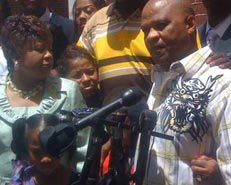Freedom and Forensic Reform
08.17.09

Ernest Sonnier (above) was freed in Texas on August 7 after DNA testing obtained by the Innocence Project proved his innocence of a 1985 rape for which he was wrongfully convicted. His is the latest in a string of cases in which faulty forensics at the Houston Police Department Crime Lab played a role in a wrongful conviction. A two-year audit of the lab found questionable testing in many cases that still must be evaluated for possible retesting.
Learn more about his case
.
Nationwide, people have been wrongfully convicted – while actual perpetrators of crime remained at large – because unvalidated or improper forensic science led investigators astray. Too many forensic science disciplines have never been subjected to rigorous scientific scrutiny. Even when the science is solid, forensic analysts sometimes conduct their testing improperly or misinterpret results. In some cases, forensic analysts falsify results or engage in other misconduct.
Learn more about how unvalidated or improper forensic science contributes to wrongful convictions
.
After an unprecedented report earlier this year from the National Academy of Sciences found serious problems with forensic practices in the U.S., the Innocence Project called for the creation of a federal Office of Forensic Science Improvement and Support to oversee and support forensics throughout the country. Learn more about this critical reform and add your voice to a petition calling for forensic reform at
the Just Science Coalition website
.
Forensic Science in the News:
CNN’s "Anderson Cooper 360"
launches a new series tonight
investigating the role of faulty forensics in wrongful convictions and focusing on the case of Ernest Sonnier.
The Oregon Attorney General’s office said Friday that
a man serving three life sentences for murders he says he didn’t commit should be freed while prosecutors consider retrying him
. He was convicted based in part on testimony regarding an FBI ballistic test that has since been discredited.
Dog scent evidence is among the forensic fields widely considered to be lacking in scientific rigor. One dog handler in Florida, John Preston, was involved in two wrongful convictions later overturned by DNA testing – the cases of Wilton Dedge and William Dillon.
Dedge marked the fifth anniversary of his exoneration last week, but questionable convictions involving Preston have still not been subjected to an independent review
.
A recent cover story in Popular Mechanics
explores the problems with many forensic disciplines and focuses on two recent Innocence Project exonerations that highlight the consequences of a lack of forensic science research, standards and oversight.

Leave a Reply
Thank you for visiting us. You can learn more about how we consider cases here. Please avoid sharing any personal information in the comments below and join us in making this a hate-speech free and safe space for everyone.